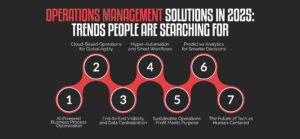
A digital footprint is left behind with every click, every transaction, and every process in the modern business world. As the majority of organizations continue to figure out how to monitor that data, industry leaders are already using it to forecast, streamline, and innovate.
That is what Operations Management Solutions are designed to do: convert traditional working processes into intelligent, data-driven ecosystems. These solutions in 2025 are not merely about the effective management of operations; they are also about reinventing business operations, competition, and growth.
What influences the development of modern operations, then? Let’s explore the top trends people are searching for and adopting to stay ahead.
AI-Powered Business Process Optimization
No longer just a theory, Artificial Intelligence is now the driving force behind faster and smarter workflows. AI-driven automation and business process optimization are among the most popular trends in Operations Management Solutions that have been searched for in 2025.
Companies are increasingly using AI to:
![]() Predict demand and manage resources efficiently automatically.
Predict demand and manage resources efficiently automatically.
![]() Eradicate manual process duplications.
Eradicate manual process duplications.
![]() Identify bottlenecks in work processes before they affect delivery.
Identify bottlenecks in work processes before they affect delivery.
Organizations are converting raw data into strategic information (using machine learning and predictive analytics) to enhance departmental performance. This change enables decision-makers to focus on growth rather than being bogged down in operational complexities.
Put briefly, AI is not killing humans; it is simply making them smarter at their work.
Cloud-Based Operations for Global Agility
The flexibility has become a necessity due to remote work, hybrid teams, and global supply chains. It is the cloud integration of Operations Management Solutions that enables businesses to remain agile without losing control.
Cloud-based platforms provide organizations with the opportunity to:
![]() Access real-time information from any place.
Access real-time information from any place.
![]() Collaborate seamlessly across departments.
Collaborate seamlessly across departments.
![]() Scale resources instantly based on demand.
Scale resources instantly based on demand.
And it is not only about convenience, it is about being competitive. Industry reports have estimated that by 2025, more than 80% of companies will utilize cloud operations as a source for at least part of their workflow management.
The trend ensures that operations can no longer be tied to physical infrastructure, but rather adapt in real-time to market changes.
End-to-End Visibility and Data Centralization
Data is the new fuel, but scattered data is chaos. The 2025 Businesses are making a massive investment in Operations Management Solutions, which enable all processes, metrics, and reports to fit into a single platform.
Centralized dashboards ensure that the leaders have complete visibility of performance metrics that include:
![]() Production timelines
Production timelines
![]() Resource allocation
Resource allocation
![]() Cost efficiency
Cost efficiency
![]() Customer satisfaction
Customer satisfaction
Such end-to-end transparency can not only help optimize Business Processes, but can also instigate more innovative strategies. With related data streams, managers have the opportunity to make quicker, evidence-based choices that have a direct impact on productivity and profitability.
Hyper-Automation and Smart Workflows
Automation is no longer done on repetitive jobs. With hyper-automation, the new wave, robotic process automation (RPA), AI, and analytics are combined to construct self-adapting workflows.
Operations Management Solutions can now automate approvals, generate predictive reports, and even reroute projects, all based on real-time information.
To elaborate, when a delay occurs in a single department, the system automatically reallocates resources or rearranges schedules to maintain process efficiency. Such a self-corrected process of work really minimizes human error and increases output at a very rapid rate.
The result? Faster turnarounds, leaner operations, and quantifiable ROI.

Sustainable Operations: Profit Meets Purpose
Sustainability is no longer merely a moral objective, but also an operational one. In 2025, businesses are focusing on eco-efficient models by incorporating Operations Management Solutions that monitor energy use, minimize waste, and optimize logistics.
Through Business Process Optimization, companies can:
![]() Reduce transportation expenses and emissions.
Reduce transportation expenses and emissions.
![]() Automate processes to reduce paper consumption.
Automate processes to reduce paper consumption.
![]() Embrace intelligent scheduling to manage resources effectively.
Embrace intelligent scheduling to manage resources effectively.
This concern for sustainable efficiency not only enhances brand image but also leads to cost savings and adherence to green policies, which is bound to gain momentum in the years ahead.
Predictive Analytics for Smarter Decisions
The most forward-thinking organisations aren’t waiting for problems; they’re predicting them. Predictive analytics, now an integral feature of Operations Management Solutions, helps companies understand when demand will surge, when resources will be in short supply, and when machinery will require attention before it becomes a problem.
Strategic decisions can be made more effectively by companies, whether through supply chain risk management or financial results forecasting, by analyzing historical and real-time data.
Ideally, predictive intelligence is transforming reactive management into proactive leadership.
The Future of Tech as Human-Centered.
Although technology is the driving force behind progress, people are taking center stage in 2025. Companies are realizing that the most effective Operations Management Solutions are those that are built to be user-friendly, rather than necessarily efficient.
The teams can work more easily and adapt to digital systems through intuitive interfaces, mobile accessibility, and AI-driven suggestions. The operations of the future are not only more intelligent, but increasingly more human.
Final Thoughts:
The future of Operations Management Solutions in 2025 marks a turning point. It is no longer about maintaining the lights, but about constant change through innovative means.
Ranging from AI-based Business Process Optimization to sustainable automation, these trends demonstrate that the future of operations is one where organizations are prepared to incorporate intelligent and data-driven decision-making.
The early adopters will not only run more efficiently in business, but they will also run faster and smarter, along with increased confidence in their markets.
At MIS, we design scalable, intelligent Operations Management Solutions that bring automation, clarity, and control to every stage of your business.
Related Blogs
 Why Managed Cybersecurity Services Are No Longer Optional - Every 39 seconds, a cyberattack occurs somewhere in the world. In fact, global cybercrime damages are projected to reach $10.5 trillion annually by 2025 (Cybersecurity Ventures). This rising menace is no longer a remote possibility to businesses of all sizes: it is a day-to-day reality. The increased remote working, cloud usage, and digital-first approaches have […]
Why Managed Cybersecurity Services Are No Longer Optional - Every 39 seconds, a cyberattack occurs somewhere in the world. In fact, global cybercrime damages are projected to reach $10.5 trillion annually by 2025 (Cybersecurity Ventures). This rising menace is no longer a remote possibility to businesses of all sizes: it is a day-to-day reality. The increased remote working, cloud usage, and digital-first approaches have […] Managed Cybersecurity Services vs In-House Security: Which Is Better for Your Business? - Today, protecting your company’s data and digital assets is absolutely vital, as we do business primarily online. With more and more cyber threats, companies of every size are now considering better security solutions. Now, you have to make a choice: should you let a managed security service handle security, or have your security teams? Both […]
Managed Cybersecurity Services vs In-House Security: Which Is Better for Your Business? - Today, protecting your company’s data and digital assets is absolutely vital, as we do business primarily online. With more and more cyber threats, companies of every size are now considering better security solutions. Now, you have to make a choice: should you let a managed security service handle security, or have your security teams? Both […] How to Stay Ahead of Evolving Threats - Cybersecurity threats are becoming more sophisticated every year, and ransomware remains one of the most pressing challenges for businesses globally. With 2025 on the horizon, are you prepared to combat this evolving menace? This implies that corporations should initiate a solid protection plan against these threats, and here at McLane Intelligent Solutions, we know how […]
How to Stay Ahead of Evolving Threats - Cybersecurity threats are becoming more sophisticated every year, and ransomware remains one of the most pressing challenges for businesses globally. With 2025 on the horizon, are you prepared to combat this evolving menace? This implies that corporations should initiate a solid protection plan against these threats, and here at McLane Intelligent Solutions, we know how […]
Schedule a Consultation
Contact McLane Intelligent Solutions and Experience Texas IT Services Without The Geek Speak
